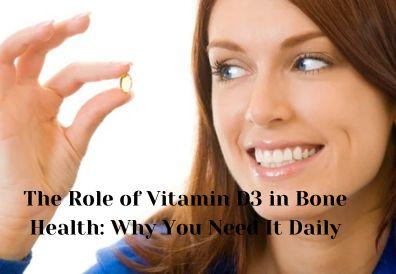Introduction
Strong and healthy bones are essential for a fulfilling life, but did you know that Vitamin D3 plays a crucial role in maintaining optimal bone health? Often referred to as the "sunshine vitamin," Vitamin D3 helps the body absorb calcium, the primary building block of bones. Without enough of this vital nutrient, bones can become weak, leading to conditions like osteoporosis and fractures.
In this blog, we’ll explore how Vitamin D3 supports bone health, why you need it daily, and how to ensure you’re getting enough.
1. Enhances Calcium Absorption
Calcium is the foundation of strong bones, but without Vitamin D3, your body cannot absorb it efficiently. Vitamin D3 stimulates calcium absorption in the intestines, ensuring that bones receive adequate amounts to remain strong and dense.
2. Prevents Bone Loss and Fractures
A deficiency in Vitamin D3 can lead to weakened bones, increasing the risk of osteoporosis (bone thinning) and fractures, especially in older adults. Research shows that Vitamin D3 supplementation significantly reduces the risk of bone fractures.
3. Strengthens Bone Density
Bone density naturally declines with age, but Vitamin D3 plays a key role in maintaining bone mineral density. People with higher Vitamin D levels tend to have stronger bones and a lower risk of osteoporosis.
4. Supports Overall Skeletal Structure
From childhood to old age, Vitamin D3 ensures proper bone growth and maintenance. It is essential for children's bone development and for maintaining skeletal integrity in adults.
Not getting enough Vitamin D3 can have severe effects on bone health. Common symptoms of deficiency include:
✅ Bone pain and muscle weakness
✅ Frequent fractures or brittle bones
✅ Joint discomfort and stiffness
✅ Fatigue and low energy levels
✅ Poor posture and spinal issues
If you experience any of these symptoms, it may be time to check your Vitamin D levels and consider supplementation.
1. Sunlight Exposure
Sunlight is the best natural source of Vitamin D3. Spending 15-30 minutes in direct sunlight (without sunscreen) several times a week can help maintain healthy levels. However, factors like geographical location, season, and skin type can affect sun exposure.
2. Vitamin D3-Rich Foods
Including these Vitamin D3-rich foods in your diet can help boost levels:
-
Fatty fish (salmon, mackerel, sardines)
-
Egg yolks
-
Fortified dairy products (milk, cheese, yogurt)
-
Mushrooms (exposed to sunlight)
-
Fortified cereals and orange juice
3. Vitamin D3 Supplements
If you struggle to get enough Vitamin D3 from sunlight and food, supplements are an effective way to maintain optimal levels.
Certain groups of people are at a higher risk of Vitamin D3 deficiency and should prioritize supplementation:
🔹 Older adults (bone density naturally declines with age)
🔹 People with limited sun exposure (working indoors, living in cold regions)
🔹 Individuals with darker skin (melanin reduces Vitamin D absorption)
🔹 Those with lactose intolerance or dairy allergies
🔹 Pregnant and breastfeeding women (for maternal and infant bone health)
When selecting a Vitamin D3 supplement, consider the following:
✔ Dosage – The recommended daily intake is 600-800 IU, but higher doses may be required for deficiency.
✔ Quality & Purity – Look for third-party tested supplements like Vitamin D3 from TheVitashope.
✔ Combination with Other Nutrients – Some formulas include calcium or omega-3s for enhanced bone health.
For a complete vision and bone health package, consider AREDS 2 + Omega-3.
Vitamin D3 is an essential nutrient for bone health, ensuring proper calcium absorption, preventing osteoporosis, and maintaining strong bones throughout life. Unfortunately, many people don’t get enough from sunlight or diet alone, making supplementation a reliable option.
Taking Vitamin D3 daily can help protect your bones, reduce fracture risks, and support overall skeletal strength. Don’t wait until it’s too late—start prioritizing your bone health today!
✅ Shop for premium Vitamin D3 supplements at TheVitashope!
1. Can I get enough Vitamin D3 from food alone?
While some foods provide Vitamin D3, most people need additional sun exposure or supplements to maintain healthy levels.
2. How long does it take for Vitamin D3 to improve bone health?
It varies, but noticeable improvements in bone strength and energy levels can take a few months with consistent supplementation.
3. Can Vitamin D3 prevent osteoporosis?
Yes! Regular Vitamin D3 intake, along with calcium and exercise, helps prevent osteoporosis and reduces the risk of fractures.
4. Is Vitamin D3 safe for daily use?
Yes, but avoid excessive doses. Stick to the recommended intake unless advised by a healthcare provider.
5. What’s the best time to take Vitamin D3?
It’s best taken with a meal containing healthy fats to enhance absorption. Morning or midday is ideal.



